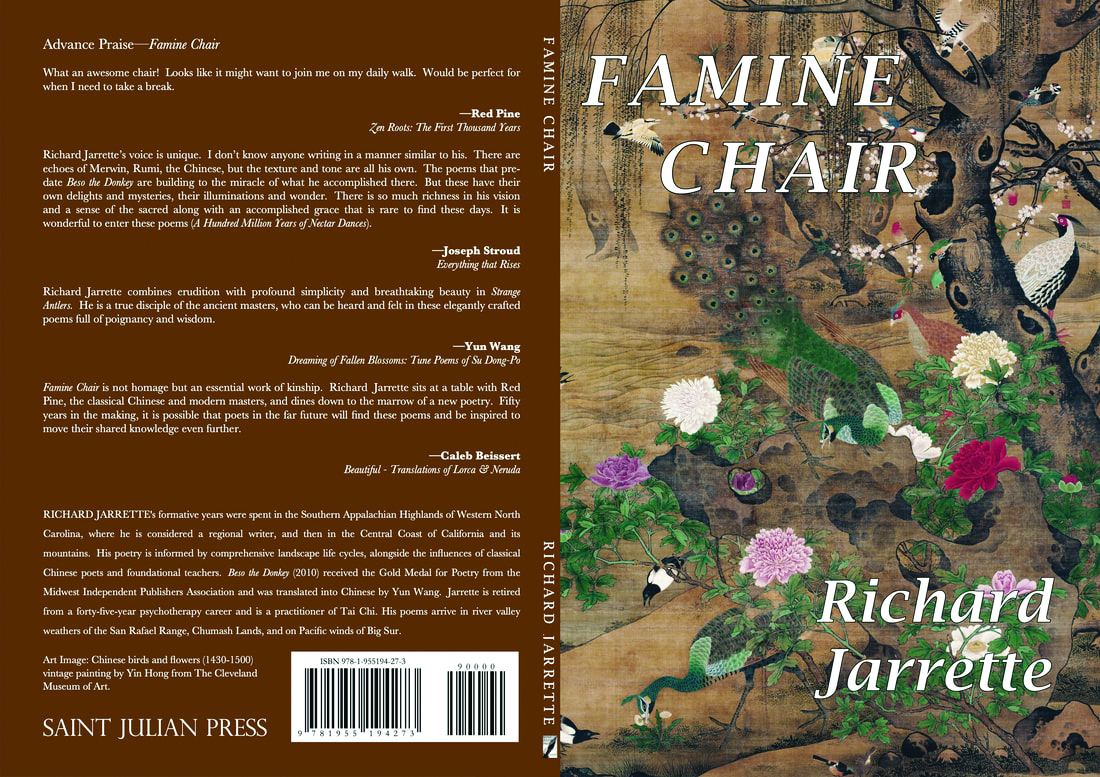
3 minute read
POETRY REVIEW: Famine Chair by Richard Jarrette - The Art of Long-Form Poetry is Alive and Well
By Jesse Caverly / VOICE
RICHARD JARRETTE’S FAMINE CHAIR IS A BOOK WITH THE BEST KINDS OF CONTRADICTIONS: lush yet minimal, transitory yet solid. It serves as a good example of how more than one thing can be true at the same time. It’s not a hip hop DJ set—sampling and record scratching and bending the original song into new music—but it bears a resemblance. It begins with source material: the author’s friend, BillPorter/Red Pine, a Buddhist translator, tells tales of his journeys in China, and quickly moves into new reflective territory.
Publishing houses don’t publish long-form poetry (poetry cycles) that much these days. The current tastes often run more lean, as consumption of content has been so heavily shaped by the shortened attention span of media consumers into soundbites, reels, and clips. Jarrette’s magnum opus, the Donkey, (Michigan State University Press, 2010) pushed successfully against that, becoming a giant literary hit. Famine Chair continues Jarrette’s exploration of the pieces of a cosmic whole, and in 2024, that is indeed a very brave challenge to take on.
Famine Chair (Saint Julian Press, 2024) is also very much a minimalist fever dream. This is the kind of poetry that is read for its mood as well as what it might have to say. There is a great deal of negative space on each page, a breathwork that encourages the reader to slow down. You have all the time in the world. He writes stanzas just long enough to require your attention but short enough to move you along to the next in search of a larger narrative.
It feels akin to other writers who set a tone of mindfulness in their work, such as Thích Nhất Hạnh, Eckhart Tolle, and Rudolf Steiner—and while those authors reasons are apparent and clear, Jarrette is more of a mystery. The book is split into two parts, however, and in the second, “Wheresoever,” we find our footing in the emergence of Jarrette as a new being, a new wholly realized person. The book begins with homage, reflection, and ends in the legacy of the new.
If Michael Ondaatje’s The Collected World of Billy the Kid (Anansi Press, 1970) is poetry as biography, and Anis Mojgani’s In the Pockets of Small Gods (Write Bloody, 2016) is poetry as eulogy, what is Famine Chair? Is it poetry as transcript? Poetry as “If you could have dinner with one famous person, dead or alive, who would it be?” Poetry as liminal space?
It is hard at this point to say, as Jarrette’s work requires time to consider, and return to—but as far as poetry cycles go, this is one that deliciously eats its own tail.
Available for order locally at Chaucer’s Books and online at www.bookshop.org/shop/saintjulianpress, Barnes & Noble, and Amazon. Richard Jarrette, pre-pandemic, was a poetry columnist for Voice. He author of Beso the Donkey (2010), A Hundred Million Years of Nectar Dances (2015), The Beatitudes of Ekaterina (2017), The Pond (2019), Strange Antlers (2022), and Famine Chair (2024).

